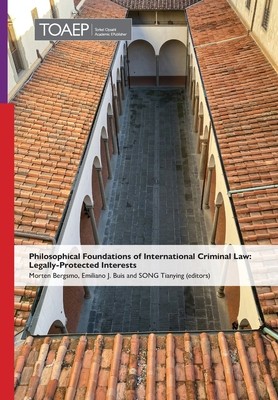
- We will send in 10–14 business days.
- Publisher: Torkel Opsahl Academic Epublisher
- ISBN-10: 8283481215
- ISBN-13: 9788283481211
- Format: 15.6 x 23.4 x 2.2 cm, kieti viršeliai
- Language: English
- SAVE -10% with code: EXTRA
Philosophical Foundations of International Criminal Law (e-book) (used book) | bookbook.eu
Reviews
Description
This book discusses notions such as 'community interest', 'legally-protected interest' and 'legal good' in the context of international criminal law. The authors assess main interests or values currently protected by international criminal law (including 'humanity' and 'international peace and security'), their characteristics and inter-relations. Chapters then zoom in on supplementary values or interests that should receive further recognition by international criminal law, among them 'reconciliation', 'solidarity' and 'unity of humankind'. A growing sense of environmental and security threats to our survival invites us to afford the value of 'unity of humankind' a greater measure of affirmation also through international criminal law.
The anthology offers nine chapters by thirteen authors from diverse backgrounds, including China, India, Latin America, the Middle East, Nigeria and Western European and Other States Group, in alphabetical order: Ioanna N. Anastasopoulou, David Baragwanath, Morten Bergsmo, Emiliano J. Buis, Vahyala Kwaga, Susan R. Lamb, Melody Mirzaagha, Salim A. Nakhjavani, Tosin Osasona, Kafayat Motilewa Quadri, Rod Rastan, Surabhi Sharma and SONG Tianying. The questions they discuss go beyond the growing polarisation between rival 'great powers' and have some capacity to unite actors in a common, forward-looking endeavour. The editors argue that new international criminal law-making should be genuinely representative of humankind.
This is the third volume in the series Philosophical Foundations of International Criminal Law published by TOAEP. The three volumes combined contribute 37 chapters organized in three thematic anthologies: Correlating Thinkers (2018), Foundational Concepts (2019), and now Legally-Protected Interests (2022).
EXTRA 10 % discount with code: EXTRA
The promotion ends in 22d.06:34:21
The discount code is valid when purchasing from 10 €. Discounts do not stack.
- Publisher: Torkel Opsahl Academic Epublisher
- ISBN-10: 8283481215
- ISBN-13: 9788283481211
- Format: 15.6 x 23.4 x 2.2 cm, kieti viršeliai
- Language: English English
This book discusses notions such as 'community interest', 'legally-protected interest' and 'legal good' in the context of international criminal law. The authors assess main interests or values currently protected by international criminal law (including 'humanity' and 'international peace and security'), their characteristics and inter-relations. Chapters then zoom in on supplementary values or interests that should receive further recognition by international criminal law, among them 'reconciliation', 'solidarity' and 'unity of humankind'. A growing sense of environmental and security threats to our survival invites us to afford the value of 'unity of humankind' a greater measure of affirmation also through international criminal law.
The anthology offers nine chapters by thirteen authors from diverse backgrounds, including China, India, Latin America, the Middle East, Nigeria and Western European and Other States Group, in alphabetical order: Ioanna N. Anastasopoulou, David Baragwanath, Morten Bergsmo, Emiliano J. Buis, Vahyala Kwaga, Susan R. Lamb, Melody Mirzaagha, Salim A. Nakhjavani, Tosin Osasona, Kafayat Motilewa Quadri, Rod Rastan, Surabhi Sharma and SONG Tianying. The questions they discuss go beyond the growing polarisation between rival 'great powers' and have some capacity to unite actors in a common, forward-looking endeavour. The editors argue that new international criminal law-making should be genuinely representative of humankind.
This is the third volume in the series Philosophical Foundations of International Criminal Law published by TOAEP. The three volumes combined contribute 37 chapters organized in three thematic anthologies: Correlating Thinkers (2018), Foundational Concepts (2019), and now Legally-Protected Interests (2022).


Reviews